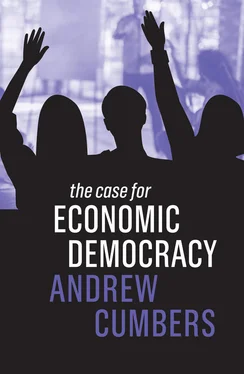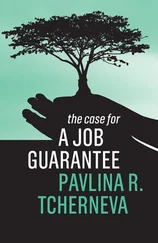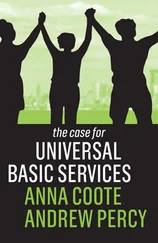In developing my argument here, there are three key ‘pillars’ that run through the remainder of the book. The first is the centrality of individual economic rights. Democracy, as the political theorist Robert Dahl reminds us (Dahl 1985), is fundamentally about individuals being able to exercise their democratic rights by participating in decision-making processes. This applies equally to the economy as it does to other areas of polity and society. Second, and following on from the discussion above, securing these rights requires much greater collective and democratic ownership of firms, resources and property than exists at present. I go on to argue that this requires a mixed (markets and planning) economy of diverse collective ownership as an alternative organizational ethos to the private property dominance of global capitalism. Alongside and enabling these first two pillars is a third: the need to widen and deepen public engagement and participation in decision making to cultivate a more democratic and deliberative political economy. Taken together, these are fundamental supports for transcending capitalism and moving towards a democratic economy.
Following this Introduction, the book consists of four chapters. In the next chapter, I explore a brief history of economic democracy, movements for workplace and industrial democracy, their achievements and weaknesses, as well as the successes but also democratic failings of social democracy. I then develop my own framework for economic democracy, founded around the three pillars in chapter 2. Chapter 3explores examples of existing initiatives and practice for each of the three pillars, while in the Conclusion, I restate my argument and explore some of the policies required to enact my broader sense of economic democracy. I also consider some of the constraints and vested interests to be overcome and how we might mobilize to make the democratic economy a reality.
1 1. See, for example, senior Democrat Nancy Pelosi’s recent dismissal of the Green New Deal in the US.
2 2. Some research that I carried out for the Scottish public sector union, UNISON, in the mid-2000s showed no significant relationship between level of taxation and economic growth when comparing countries in the OECD (Birch and Cumbers 2007).
Конец ознакомительного фрагмента.
Текст предоставлен ООО «ЛитРес».
Прочитайте эту книгу целиком, на ЛитРес.
Безопасно оплатить книгу можно банковской картой Visa, MasterCard, Maestro, со счета мобильного телефона, с платежного терминала, в салоне МТС или Связной, через PayPal, WebMoney, Яндекс.Деньги, QIWI Кошелек, бонусными картами или другим удобным Вам способом.












